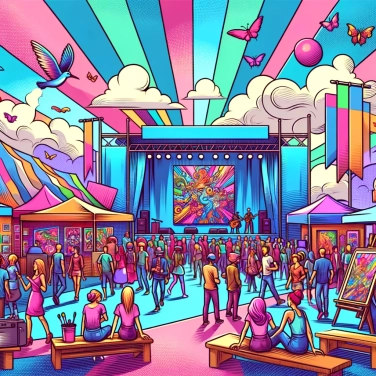Clowns can be scary to some people because of their fear of the unknown, painted or masked faces, exaggerated expressions, and unpredictable behavior.

The fear of clowns, known as coulrophobia, is based in part on a phenomenon called the uncanny valley. This is when something seemingly familiar feels slightly off, generating a vague discomfort. The painted and exaggerated faces of clowns often evoke this feeling: we recognize a human face, but it is not quite right. The ambiguity of the emotions expressed, hidden behind extravagant makeup and a forced smile, heightens this unsettling sensation. The brain then unconsciously perceives a discrepancy between appearance and true intentions, triggering an instinctive alarm signal related to distrust and potential danger.
The face of a clown often wears an exaggerated and frozen smile that doesn't change, no matter what the person truly feels behind the mask. This disconnect between the displayed expression and their true emotions muddles our usual signals of trust. Our brains are trained from a young age to understand the emotions of others through their faces. But in the presence of a clown, it’s impossible to clearly decipher what they are really feeling. As a result, we experience stress or a certain discomfort. This inability to clearly identify whether the clown is happy, sad, or threatening creates a disturbing impression for some, even leading to anxiety.
Movies and books have often made clowns creepy, especially thanks to famous figures like Pennywise, the evil clown from Stephen King's "It". This character has reinforced the image of the dangerous clown in popular consciousness. Dark humor or sinister parodies of clowns in TV shows and video games have also emphasized this strange and unsettling aspect. For example, Batman's Joker, although he is technically not a traditional clown, mixes violence and clown makeup, contributing to this fear. As a result, after seeing these representations, the friendly clown from circuses becomes synonymous with anxiety for some.
Many children or even adults develop a fear of clowns after a negative or traumatic encounter. Typically, this happens after a failed birthday party or public event: a clown that is too persistent, clumsy, or unpredictable can quickly create discomfort. If the clown startles a child, follows them when they try to move away, or displays an oppressive attitude, it can be permanently etched in their memory. This negative experience sometimes transforms into a true phobia called coulrophobia. Even anecdotes that seem trivial to those around them can have a lasting psychological impact on the person involved.
Our brain loves to recognize familiar faces. But seeing a clown with exaggerated makeup muddles that recognition. This is called the uncanny valley effect: when a face is almost human but not quite, it evokes a deep sense of unease. We also feel this in front of strange dolls or very realistic but poorly made humanoid robots. Additionally, the contrast between the clown's forced joyful appearance (fixed big smile) and its unpredictable movements creates cognitive ambiguity. Our brain hates this uncertainty; it doesn't quite know what to expect. As a result, some quickly associate clowns with something frightening. It's almost automatic and hard to control.
In certain indigenous cultures, the character of the clown or 'heyoka' plays a spiritual and symbolic role by reversing established social norms, thereby serving as a catalyst for introspection and individual or collective awareness.
The exact term for the fear of clowns is 'coulrophobia,' derived from the Greek words 'kôlobathristès' (stilt walker) and 'phobos' (fear).
According to a scientific study conducted in 2008 at the University of Sheffield, hospitalized children often perceive medical clowns as frightening rather than entertaining, calling into question their therapeutic effectiveness with pediatric patients.
John Wayne Gacy, the infamous American serial killer, earned his living by hosting children's parties under the guise of a clown named 'Pogo,' contributing to the frightening image of clowns in American popular culture.
The fear of clowns tends to be influenced by their appearance, behavior, and the context in which they appear. Clowns with exaggerated makeup, frozen smiles, or those appearing in unsettling or unusual contexts can intensify this fear compared to clowns with minimal makeup, which are considered more reassuring.
Like many other phobias, coulrophobia can be effectively treated using cognitive-behavioral therapy (CBT), which often involves gradual exposure to the anxiety-provoking stimulus, along with relaxation techniques and an awareness of the origins of this fear.
The fixed smiles of clowns often evoke a phenomenon known as the "uncanny valley," where the perception of forced or inauthentic human expressions creates a sense of unease in the observer. The inconsistency between displayed emotions and true intentions or feelings generates anxiety and distrust.
Sure! Here’s the translation: "Yes, absolutely. The fear of clowns does not necessarily stem from a personal traumatic experience. It can arise from cultural representations, movies, stories told, or the unconscious perception of ambiguity or uncanny strangeness associated with the unusual appearance of clowns."
Yes, even though it is not officially recognized as a specific phobia by some diagnostic manuals, coulrophobia (fear of clowns) is relatively common among adults and children, mainly due to anxiety-inducing cultural representations and the ambiguous nature of clowns.

No one has answered this quiz yet, be the first!' :-)
Question 1/5